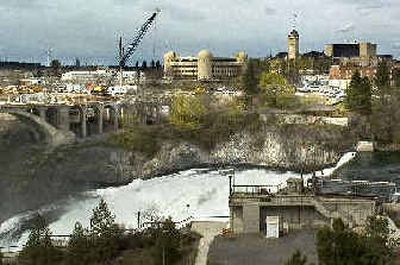Parkland eyed for development

A developer who wants to build an upscale urban village in Spokane has quietly proposed using a slice of Riverfront Park between the Post and Monroe street bridges for an adjoining public market and other commercial uses.
The deal, which enjoys substantial support within City Hall, revolves around possible lease of the park-land by developer Marshall Chesrown.
If accepted, the parkland proposal could completely remake the north side of the lower Spokane Falls and throw the city into a new public-private partnership at the same time it’s tallying losses from a troubled River Park Square parking garage deal dating back to the late 1990s.
“It is very preliminary,” Chesrown said Friday. “It’s so preliminary, it’s all speculation.”
City officials, who asked not to be identified, said the proposal has been embraced within the administration of Mayor Jim West, who campaigned two years ago as a proponent of economic development.
The mayor and others are backing the idea as a way to encourage downtown housing, bring more business to downtown’s retail core, and boost the city’s sluggish tax base. Some estimates place the value of Chesrown’s overall project at nearly $1 billion.
“It’s going to add a lot more weight to the downtown area,” said one top official.
Mike Edwards, president of the Downtown Spokane Partnership, said, “The city has an opportunity to make something really dynamic happen in this community and they need to take advantage of it.”
Edwards said the proposals would mesh well with plans to create new recreational opportunities in the open spaces of the river gorge below the falls.
The proposal to use city parkland surfaced briefly Thursday afternoon during a meeting of the Spokane Park Board.
Steve McNutt, chairman of the board’s Riverfront Park Committee, acknowledged publicly that the city has been approached by Chesrown about development on city-owned parkland, but he gave no details. The committee had been briefed in a meeting on Monday by staff from the economic development department, according to public records.
“Most of it seems worthy of continued evaluation,” McNutt said of the Chesrown proposal. “We sort of gave it a thumbs up.”
Chesrown said he is meeting on Tuesday with city officials to provide more details about his ideas.
In January, Chesrown spent $12.8 million to acquire 77 acres of land from the bankrupt Metropolitan Mortgage & Securities Co. He has proposed 1,000 dwellings and 1.5 million square feet of retail space on historic rail yards known as the Summit development under Metropolitan ownership.
The Chesrown project would take advantage of river views, shoreline open spaces and the Centennial Trail.
It is the latest in a series of upscale developments undertaken by Chesrown, including his exclusive Club at Black Rock development on Lake Coeur d’Alene with its multimillion-dollar homes. Black Rock is being marketed nationally as prime vacation property for people who have the money to buy large estates. His other developments include properties along the Spokane River, Lake Coeur d’Alene and Liberty Lake.
According to city officials, Chesrown wants to develop the former Summit site with a wide boulevard extending west of Monroe Street at about Bridge Avenue.
A public market with a viewing plaza would be built in an area now known as Veterans Court, part of which is currently being used for reconstruction of the Monroe Street Bridge.
City officials said Bridge Avenue likely would be moved slightly to the north to improve traffic flow on the bridge. The city parks department owns the Veterans Court property as well as parking lots on the north side of Bridge Avenue, which is currently being used as a detour to send southbound Monroe Street traffic to the Post Street Bridge.
Chesrown also has proposed turning a rebuilt Post Street Bridge into a promenade with vendor stalls and viewing. He has suggested keeping it open to limited traffic. City officials said it could be used by the trolley-like buses that shuttle people back and forth from the north bank to downtown.
Any additional property north of Bridge Avenue could be used for other income-producing buildings with offices or shops.
Chesrown previously has said he wants to incorporate the Centennial Trail and possibly the city’s popular gondola ride into his development.
Financing for development on parkland could come from Chesrown under a lease or through a public development corporation, officials said. Income from the property could be used to subsidize city park operations, which – like other city departments – have been undergoing budget cuts in recent years.
Chesrown and city officials said any public-private partnership would be completely different from the intertwined arrangement the city entered into with affiliates of Cowles Publishing Co., which owns The Spokesman-Review, in the late 1990s. In that deal, the city agreed to support redevelopment of River Park Square by backing its garage operation and making a federal community development loan available.
Chesrown said he offers the ability to accomplish a development more quickly than could be done through a city-only effort. But, he said, “I am completely aware” of Spokane’s likely sensitivity to private involvement on public land.